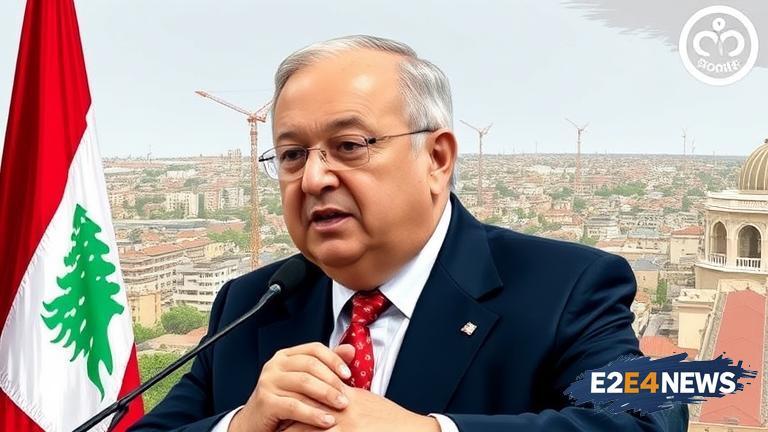In a shocking move, Lebanese Minister of Social Affairs Rashid Derbas has come forward with allegations that former Prime Minister Najib Mikati is responsible for hindering several development projects in the city of Tripoli. Derbas made these accusations during a recent press conference, where he outlined the various ways in which Mikati’s actions have negatively impacted the city’s growth and progress. According to Derbas, Mikati’s interference has resulted in significant delays and setbacks for numerous projects, including infrastructure development, urban planning initiatives, and social programs. The minister emphasized that these projects are crucial for the city’s economic and social well-being, and that Mikati’s obstructionism has caused considerable harm to the community. Derbas also stated that he has tried to address these issues with Mikati on several occasions, but his efforts have been met with resistance and a lack of cooperation. The accusations have sparked a heated debate, with some officials and citizens coming to Mikati’s defense, while others have expressed support for Derbas and his claims. The controversy has highlighted the deep-seated divisions and rivalries within Lebanon’s political landscape, and has raised questions about the country’s ability to effectively govern and develop its cities. Tripoli, in particular, has faced significant challenges in recent years, including poverty, unemployment, and a lack of basic services. The city’s residents have long called for greater investment and support from the government, but their demands have often been met with indifference or inaction. Derbas’s allegations have shed light on the complex web of interests and alliances that underpin Lebanese politics, and have underscored the need for greater transparency and accountability in the country’s governance. As the controversy continues to unfold, it remains to be seen how the situation will be resolved, and what impact it will have on the city of Tripoli and its residents. The Lebanese government has faced criticism for its handling of the situation, with some arguing that it has failed to take adequate action to address the city’s needs. Others have pointed to the role of external factors, such as regional politics and economic pressures, in shaping the country’s development trajectory. Despite these challenges, there are still many who believe that Tripoli has the potential to become a thriving and prosperous city, with a rich cultural heritage and a strong sense of community. However, this will require a concerted effort from all stakeholders, including the government, civil society, and the private sector. Derbas’s accusations have highlighted the need for a more collaborative and inclusive approach to development, one that prioritizes the needs and interests of the city’s residents. The situation in Tripoli is a microcosm of the broader challenges facing Lebanon, including corruption, sectarianism, and a lack of effective governance. Addressing these challenges will require a fundamental transformation of the country’s political and economic systems, as well as a renewed commitment to transparency, accountability, and social justice. In the meantime, the people of Tripoli will continue to suffer the consequences of neglect and mismanagement, and will be forced to rely on their own resilience and resourcefulness to survive. The international community has a role to play in supporting Lebanon’s development, but this will require a more nuanced and informed understanding of the country’s complex dynamics and challenges. By working together and prioritizing the needs of the most vulnerable populations, it may be possible to build a more just and equitable society, one that reflects the values of solidarity, cooperation, and human rights. The controversy surrounding Derbas’s accusations is a reminder that the struggle for justice and accountability is ongoing, and that there are still many obstacles to be overcome before Lebanon can achieve its full potential. Nevertheless, the fact that these issues are being openly discussed and debated is a sign of progress, and a testament to the enduring power of citizen activism and advocacy. As the situation continues to evolve, it will be important to monitor developments closely, and to hold those in power accountable for their actions. The people of Lebanon deserve nothing less, and it is up to all of us to ensure that their voices are heard and their rights are respected.
